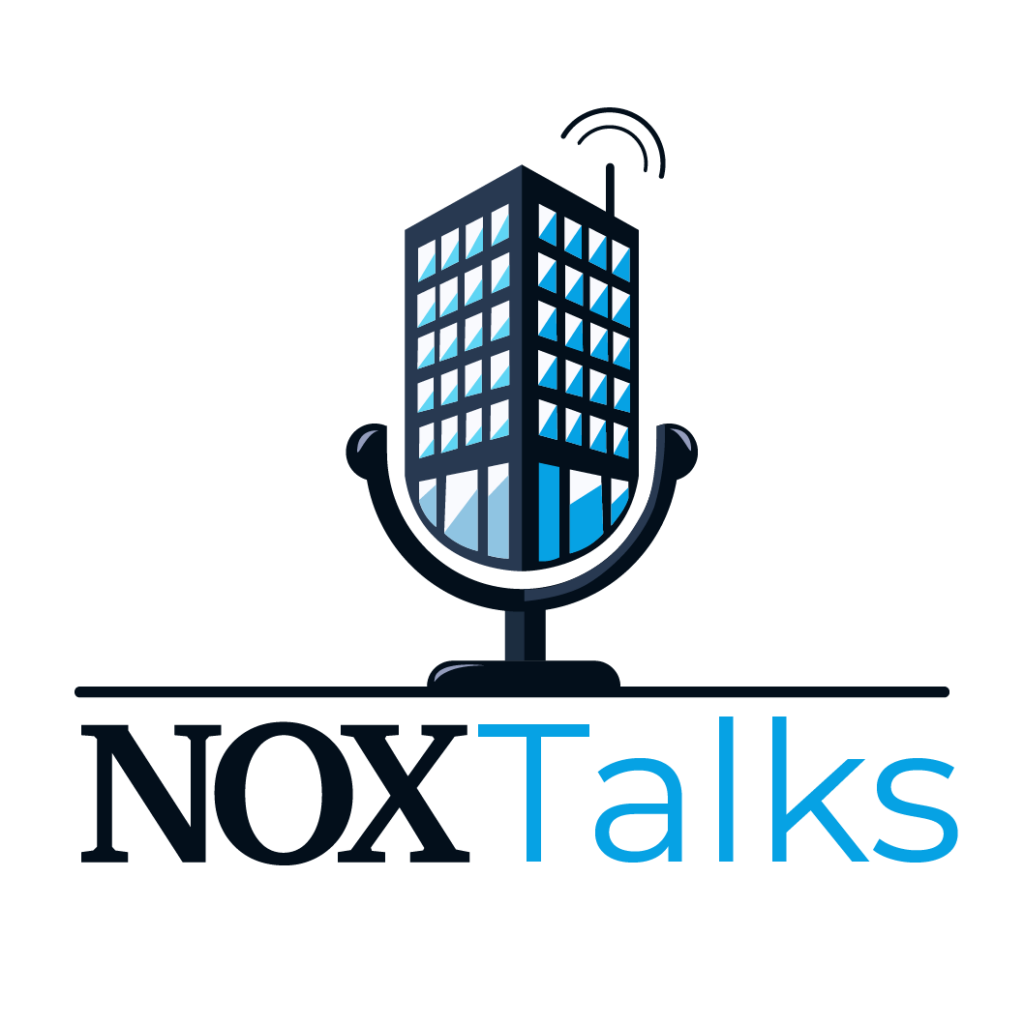The modern facility is evolving at warp speed, and at the helm of this transformation is artificial intelligence. AI-powered building automation is no longer a futuristic concept—it’s happening now. HVAC systems optimize themselves, security protocols adjust in real-time, and predictive maintenance catches failures before they happen. But as AI gets better at managing buildings, the big question looms: How much control should we actually give it?
Could AI eventually replace the traditional facility manager? Or will there always be a need for human oversight? The answer isn’t simple. While AI is spectacular at efficiency, risk reduction, and cost savings, it also lacks something crucial—human judgment. As we hand over more responsibilities to algorithms, we must carefully balance automation with the irreplaceable intuition of experienced professionals.
Hate to read? Listen to a podcast episode on this topic. Visit the NOXTalks Podcast for more episodes

AI’s Role in Building Automation
AI’s influence in facilities management is already undeniable. The old way—where humans manually adjusted HVAC settings, monitored security cameras, and scheduled maintenance—is being replaced by AI-driven optimization.
For example, AI-powered building management systems (BMS) can:
- Dynamically adjust HVAC settings based on real-time occupancy, weather patterns, and energy pricing.
- Analyze security footage and detect anomalies faster than any human ever could.
- Predict maintenance needs by analyzing sensor data, preventing costly failures before they occur.
- Manage lighting and ventilation to reduce energy waste, cutting costs and emissions.
These AI-driven systems don’t just respond to inputs; they learn. Over time, they refine their decisions, making adjustments that go beyond basic automation. A well-trained AI won’t just turn off the lights when a room is empty—it will anticipate usage patterns and optimize energy savings accordingly.
This level of intelligence raises an important question: If AI can handle so much, do we really need human facility managers at all?

The Case for Full Autonomy
Some argue that AI should take the lead in facility management, with humans playing only a minor role. And honestly, there’s a compelling case for full autonomy.
AI operates with unmatched efficiency, processing thousands of data points in real-time to adjust systems in ways no human team could match. It optimizes HVAC, lighting, and security with precision, constantly learning and refining its approach. This not only improves building performance but also reduces costs—with fewer people needed to monitor and adjust systems, businesses save on labor while slashing energy bills and maintenance expenses.
Unlike humans, AI doesn’t get tired, distracted, or make careless mistakes. It won’t overlook a failing chiller or forget to check an equipment status report. It executes tasks with unwavering consistency, making human error a thing of the past. Plus, AI’s scalability makes it ideal for large property portfolios, managing multiple buildings simultaneously without breaking a sweat.
At first glance, this all sounds like a dream—buildings that run themselves, with efficiency skyrocketing and costs dropping. But before we start handing out pink slips to facility managers, there’s another side to consider. Because while AI excels at optimization, it still falls short in ways that truly matter.
The Limits of AI
For all its strengths, AI still lacks human intuition, ethical reasoning, and adaptability in complex situations. And that’s a problem. Let’s look at why.
The Unpredictability Factor
AI thrives in structured environments with predictable data. But facilities management often deals with unpredictable human behavior and unusual emergencies. Imagine an AI controlling an office building during a fire alarm. It might optimize evacuation routes based on its data, but it won’t understand the panic, confusion, or human decision-making that can throw its calculations off. A human manager can make split-second judgment calls based on experience and instinct—something AI can’t replicate.
Ethical and Legal Concerns
AI lacks an ethical compass. It follows algorithms, not morals. If an AI security system detects unauthorized access, should it immediately lock all doors? What if someone inside needs to escape? A human can weigh the ethical considerations in ways AI simply isn’t designed to handle. And in an increasingly litigious world, who is responsible when AI makes a bad decision? The company? The programmer? The AI itself?
Customization and Human Interaction
Facility management isn’t just about optimizing temperature and monitoring security feeds—it’s also about the people in the building. Employees might prefer slightly warmer office temperatures than AI deems optimal. A conference room might need special lighting adjustments for an important meeting. These human-centric needs require a level of flexibility and customer service that AI struggles with.
Cybersecurity Risks
The more we rely on AI for facilities management, the more we open ourselves up to cyberattacks. A fully autonomous AI-run facility could be vulnerable to hacking, leading to catastrophic consequences—whether it’s shutting down a hospital’s HVAC system or disabling security at a data center. With more autonomy comes more risk, and AI systems require diligent human oversight to prevent vulnerabilities.

Striking the Right Balance
The future of facility management isn’t about AI replacing humans but rather combining strengths. A hybrid model—where AI handles repetitive tasks and data-driven optimizations while humans provide oversight and strategy—offers the best of both worlds.
AI acts as the first line of defense, taking charge of energy optimization, predictive maintenance, and anomaly detection. By automating these functions, facility managers can shift their focus to higher-level problem-solving and improving the occupant experience.
However, AI lacks human judgment, especially in emergencies and ethical dilemmas. It can suggest optimizations, but final decisions should remain in human hands, particularly when navigating unpredictable situations. AI also requires continuous learning—facility managers must train models, refine outputs, and intervene when automation misinterprets data.
Security is another critical factor. AI introduces new cybersecurity risks, making human-led monitoring essential to prevent hacking and ensure regulatory compliance. A fully autonomous system might seem efficient, but without human safeguards, it quickly becomes a liability.
Ultimately, the smartest buildings will be AI-augmented, not AI-controlled—where automation enhances efficiency while human expertise ensures adaptability, security, and ethical decision-making.
The Future: AI-Augmented Facility Managers
The role of the facility manager isn’t disappearing—it’s evolving. Tomorrow’s facility managers will be tech-savvy strategists who oversee AI-driven systems rather than micromanaging every operational detail. Think of them as orchestra conductors, ensuring all the moving parts work harmoniously, rather than individually tuning each instrument.
Instead of fearing AI as a job killer, we should embrace it as a force multiplier. It allows facility managers to focus on innovation, sustainability, and enhancing the occupant experience rather than just troubleshooting HVAC issues.
Final Thought: How Much Autonomy is Too Much?
AI should handle the technical precision of facility management, but humans must retain strategic and ethical control. A fully autonomous system might sound efficient, but it’s also risky, inflexible, and legally murky. The future belongs to AI-human collaboration—where machines handle the data, and people make the decisions that truly matter.
Because at the end of the day, AI may know how to run a building—but it doesn’t know why. And that’s why humans will always have a place in the equation.

